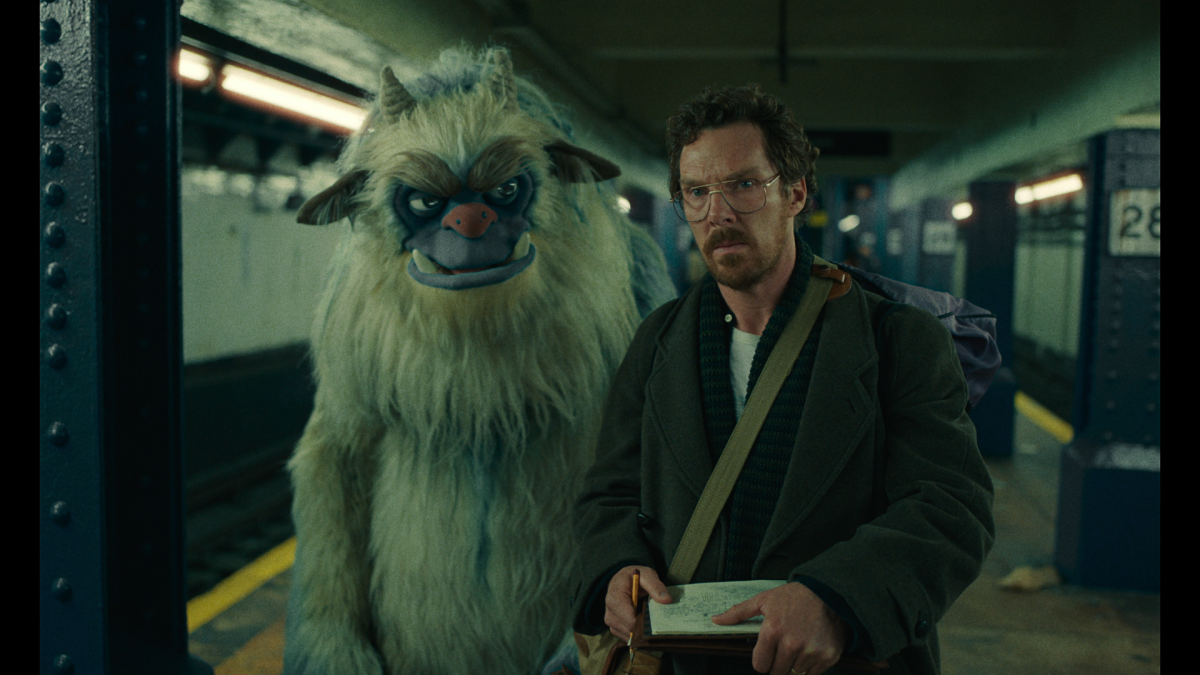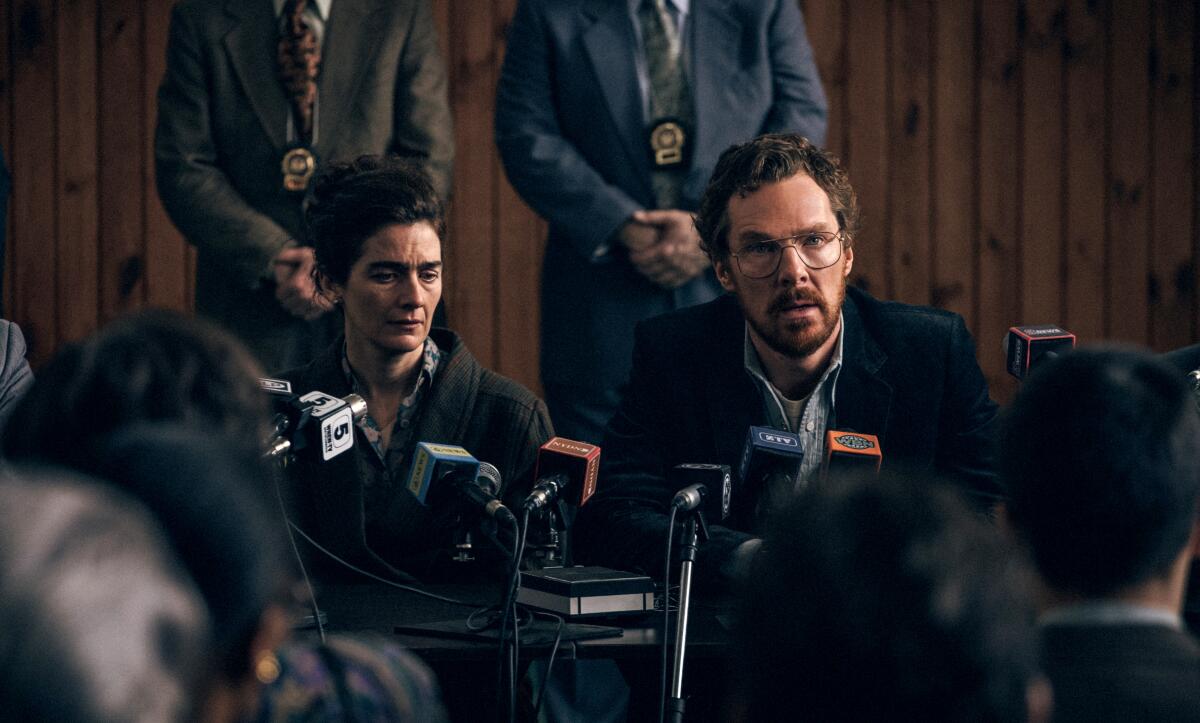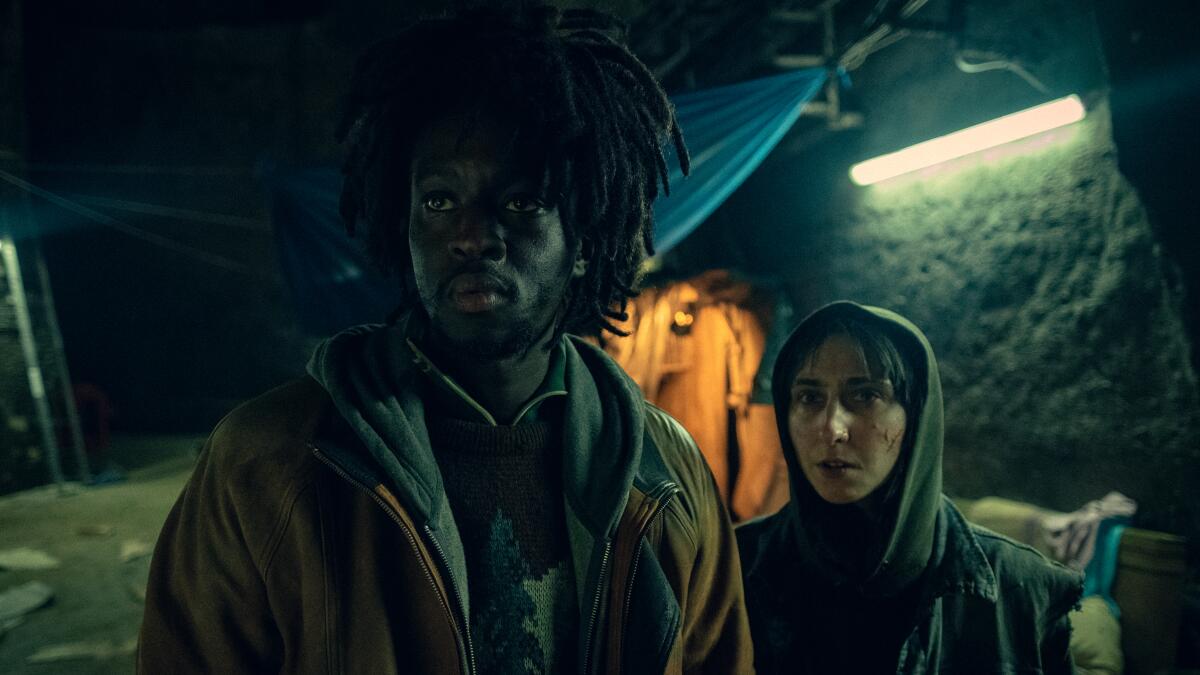In ‘Eric,’ Benedict Cumberbatch is a dad angry at everyone as he searches for his missing son

- Share via
“Eric,” a limited series premiering Thursday on Netflix, stars Benedict Cumberbatch, wearing an American accent, as Vincent Anderson, a Jim Henson-brand puppeteer, if Henson had had severe mental health issues, a drinking and drugs problem and, on top of that, was just kind of an angry, egotistical jerk. Henson is mentioned in passing, so we are not supposed to confuse the two, Vincent’s beard notwithstanding. (Coincidentally, Disney+ is premiering Ron Howard’s documentary “Jim Henson: Idea Man” on Friday, which will make that distance clear.)
The setting is 1980s New York City, in its graffiti ’n’ garbage prime, and to be fair, Vincent is only one jerk among many. There are crooked politicians, crooked cops, crooked garbagemen, dodgy street people, human traffickers and drug dealers. Vincent’s parents, who are rich, are also jerks. The Big Apple, baby! (For balance, there’s a good parent, a good cop and a good street person.)
The engine of the plot, written by Abi Morgan (who created the fine British media drama “The Hour”), is the disappearance of Vincent’s son, 9-year-old Edgar (Ivan Morris Howe), which sets Vincent, his wife, Cassie (Gaby Hoffmann), and missing-persons detective Michael Ledroit (McKinley Belcher III) — Black, gay and closeted in a homophobic environment — on toward their intertwined individual destinies. It’s not a spoiler to mention that Edgar is on a trajectory of his own.

Vincent is the brains behind “Good Day Sunshine,” a decade-old puppet-populated TV show, set in a park in an idealized inverse of the city. (It is not funky like “Sesame Street.”) Ratings are slipping and the fate of the show, which exhorts children to “be good, be kind, be brave, be different,” seems to depend entirely on Vincent coming up with a new puppet that, says producer Lennie (Dan Fogler), will somehow “bridge the gap between the preschoolers and the elementary kids,” because “that’s where the cool kids are.” (Kindergarten, apparently.)
Vincent doesn’t like this idea, or any idea not his own, one bit, and cannot help making his displeasure known, in barely veiled or extremely open terms. (He is especially disturbed by the thought that any of his characters might beatbox, which is a poor reading of the times.)
But this is not a story about children’s television, though the details of the production and the puppetry are convincing enough. It’s a mystery wrapped in a family drama wrapped ina police procedural, tricked out with fantasy element and social issues. These include the AIDS epidemic, the unequal treatment by police and media of Black victims of crime, gentrification at the expense of the poor, homelessness and the sexual exploitation of minors, with a dramatically gratuitous, if historically accurate, nod to “the free Black Americans and the immigrant Irish and German populations” who were moved from their homes to build Central Park thrown in at nearly the last moment. All that and a full platter of red herrings.
In the Netflix miniseries, Benedict Cumberbatch and Gaby Hoffmann play a troubled couple whose son goes missing, and a detective, played by McKinley Belcher III, has to unravel the disappearance.
Before his disappearance, Edgar, who is known around the studio and has precocious art skills, drew up plans for a new “walk-around” puppet, a furry blue monster he calls Eric — a blend of a Maurice Sendak Wild Thing, Sulley from “Monsters, Inc.” and the Muppets’ Sweetums — in hopes it will help save “Good Day Sunshine.” Later, discovering Edgar’s drawings, which he had frightened his son out of showing him, Vincent begins both to build the puppet in hopes that putting Eric on television will bring Edgar back, and to hallucinate its presence as a hectoring, critical constant companion.
I say “hallucinate” — and there are passing references to some kind of breakdown in Vincent’s past — but imaginary companions are always functionally real on the screen. Eric is invisible to the world, though never to us; Vincent gets some looks when he speaks to him, usually in irritation, but no one suggests that what he really ought to see is a doctor.
Viewing a man in pain, we are surely meant to feel for Vincent at least a little, but he’s so consistently annoying across so many hours, so rude not only to the suits in power but to the people on his team, that you may have trouble empathizing. (That is not how Henson did it.) “How do you have everything that you have going on in your life and you still make people struggle to have basic sympathy for you?” asks Lennie, speaking for at least one viewer. The sorry state of his marriage is obviously mostly his fault — and incidentally responsible for Edgar’s disappearance, when he sets off alone, unsupervised, as his parents bicker.

Serving as a temperamental counterweight to Vincent is Det. Ledroit, a straight-up good guy who, when not working overtime to find Edgar, is taking care of his partner as he dies from AIDS-related illness. And he’s determined to investigate a possible connection with the earlier disappearance, from the same neighborhood, of an older Black child, whose mother (Adepero Oduye, in one of the subtlest of the series’ many fine performances) haunts police headquarters, looking for help and expecting none. (Oddly, no one suggests a ransom request might be forthcoming, though Vincent is famous and his father is a wealthy developer.)
Cumberbatch has Vincent turned up to high most of the time, but he’s surrounded by quieter performances from a first-rate cast. I especially liked Bamar Kane as Yuusuf, who lives in the subway tunnels underground, and is perhaps Morgan’s least predictable character; Erika Soto as Tina, a sympathetic New York Police Department secretary; the always magnificent Clarke Peters as George, the super of Vincent’s building; and Wade Allain-Marcus as Gator, who runs a club called Lux, suspiciously located between Edgar’s home and his school, that stands generically for the excesses of 1980s Manhattan nightlife and where many characters will encounter significant plot points.
For a series with puppets, a missing child and a father in need of redemption, there are only a couple of possible endings, however twisted the route, that won’t have you cursing the six hours you spent getting there — as sentimental and simplistic as that finish may be. And “Eric” goes there, boldly.
More to Read
The complete guide to home viewing
Get Screen Gab for everything about the TV shows and streaming movies everyone’s talking about.
You may occasionally receive promotional content from the Los Angeles Times.








